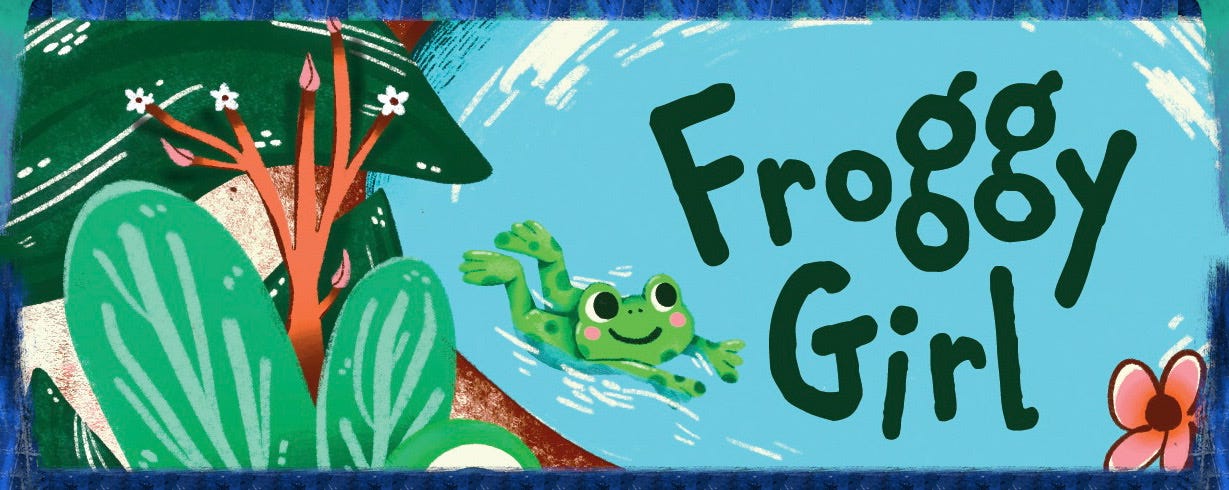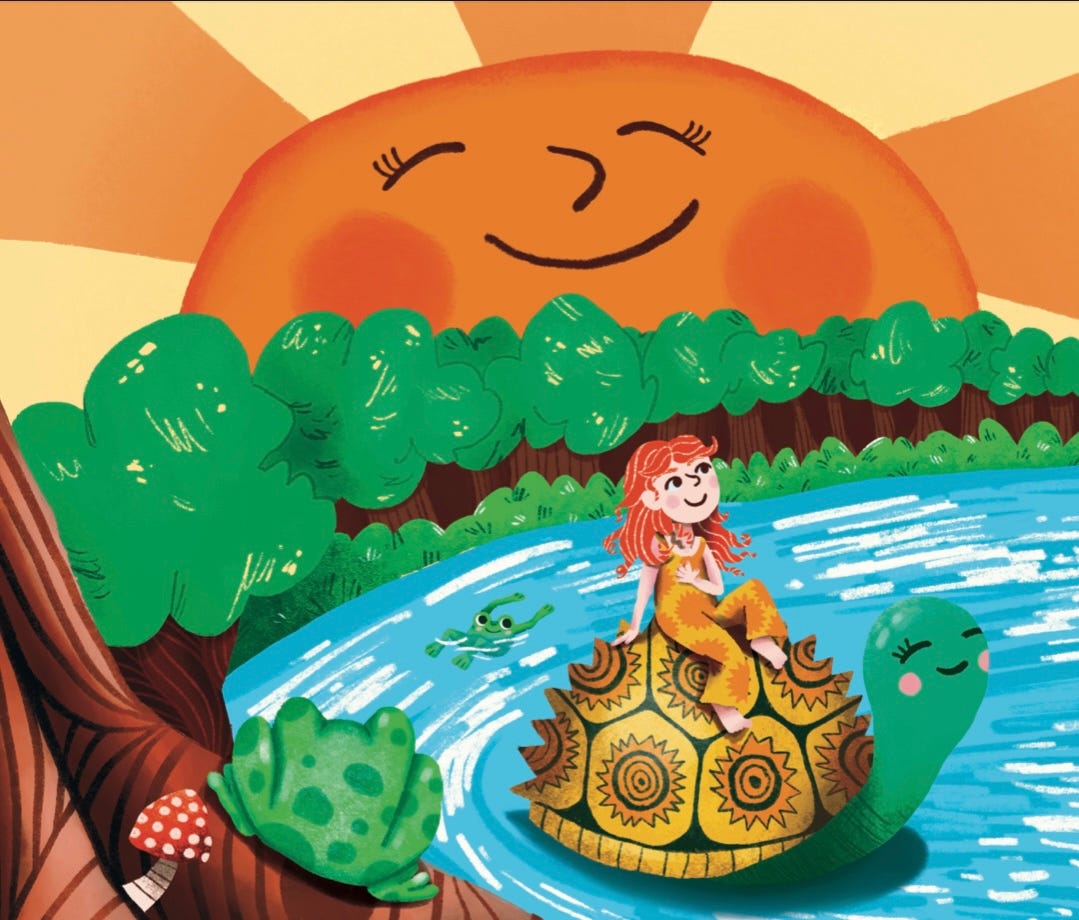Questions and Activity Supplements for Froggy Girl
Using Froggy Girl to spark meaningful conversations
“Bought your book for my 10-year old daughter. She loved it and it opened up so many conversations/questions between us. Thank you!!
“It might be fun to be a frog, but you’ll always be an amazing little girl and and that’s even better.”
In case you are new here, you may not know that I am a licensed therapist and I’ve recently released a new children’s book about self-acceptance. It is called Froggy Girl. Froggy Girl is a tale of a cute little girl who loves frogs so much that she wants to be one. She then convinces herself that she is a frog. Her parents, teacher and friends support her froggyness. However, when she tried to play with the frogs, she couldn’t do the froggy things, like catch flies or swim. While feeling sad, the little girl goes on a walk in the woods and meets a wise turtle who helps her learn that no matter what, she can’t be a frog, and she is a beautiful little girl. The story ends with her happy and dancing because she learns to appreciate the wonderful little girl that she is.
This is a classic lesson, one that has been told many times before. Froggy Girl has been compared to The Ugly Duckling, The Veleveteen Rabbit and The Mixed Up Chameleon. It was inspired by Free to Be You and Me.
I’ve put together some activity ideas and prompts to go with Froggy Girl so you can have meaningful conversations with your child after reading it.
General discussion ideas
(Please use with discretion, depending on your child’s needs and personality)
What do you like to pretend to be, but you know it isn’t true in real life? Help children understand the difference between pretending and reality. You can discuss all kinds of things they wish they were. Then, remind children that these are exciting fantasies and it is ok to imagine yourself as different things, as long as they stay in the imagination.
What are some great things about being a little girl/boy? After discussing the fantasies, then talk about the great things about being themselves. You can talk about the things they can do, and will be able to do when they grow up. Discuss how Froggy Girl helps children embrace the truth, rather than chase a fantasy.
What things about yourself are you proud of? This helps children feel good about themselves without needing constant adult praise. Also, self-validation can stop them from longing to be someone or something else. For example, many children feel jealous of a friend or a sibling.
Art or writing project prompts:
“Draw yourself and all your favorite things, not what you wish you were”. Tie in the idea that they don’t need to change themselves into something false in order to be happy, or to impress other people.
“What makes you special the way you are?” Remind them that they do not need to change their identity to be seen or feel happy. Help them understand that getting attention for lies ends badly.
Note: children (and adults) are a work in progress. Growth and change, such as learning new skills or gaining new interests are positive. Pretending to be something fake is not good. That is the differential concept to keep in mind as you discuss the ideas of self-acceptance in an age-appropriate manner.
Question prompts about the Froggy Girl Story:
Why do you think the little girl wanted to be a frog? Normalize how it’s fun to fantasize about being someone or something you love. Help your child understand that it is ok to pretend, but pretending doesn’t change who we are inside.
How did the Froggy Girl feel when she couldn’t do froggy things? Discuss how she thought being a frog was going to make her happy, but instead she felt sad because she didn’t fit in with the frogs. She figured out that she couldn’t be a frog, no matter how hard she tried. This is could be a good time to talk about how sometimes we are convinced something will make us feel happy, even though it doesn’t.
What happened when her parents, teacher and friends supported her froggyness, even though she couldn’t do the Froggy things? You can discuss how Froggy Girl was scared to tell her parents that being a frog wasn’t working because she didn’t want to disappoint everyone who affirmed the falsehood that she is a frog. The well-intentioned grown-ups in the story made a big mistake and Froggy Girl was left feeling lonely and lost.
This can also be an opportunity to talk about how children often want grown ups to give them what they desire, but when the adults follow a child’s lead, it can be a mistake. For example, if the grown ups let children eat all the junk food they want, they get awful stomach aches. In the same vein, if adults never gave children a bedtime, the children would be very tired and cranky.
If you can think of a personal example where your child wasn’t happy with a decision you made for them initially, but after, they realized you were right, that might be a good story to bring up. (Obviously a young child may not have this insight)
What lesson did Froggy girl learn? Remind your child that the girl in the story learned that she can’t be a frog, no matter how badly she wants it, even if everyone else pretends with her. She learned that accepting herself is the only way she could really feel happy.
I hope Froggy Girl sparks great discussions at home or in the classroom. You can get your copy on all major online book retail store via www.froggygirlbook.com.
*Please leave a review on Amazon, as this is a labor of love and was self-produced.
Read article about Froggy Girl in The Daily Signal.
Read a review of Froggy Girl by Holly Mathnerd.
Read reviews of Froggy Girl and A Practical Response to Gender Distress by Matt Osborne
Listen to a radio interview with Michael Berry about Froggy Girl (ten minute mark)
Listen to a radio interview with Dan Proft about Froggy Girl.
Read about Froggy Girl on Reality’s Last Stand.
Listen to me talk about Froggy Girl and other subjects with Jenny Poyer Ackerman.
Listen to me talk about Froggy Girl and several other subjects with Benjamin Boyce
Listen to Josh Slocum and I talk about Froggy Girl and other subjects. (23 minute mark)
Pamela Garfield-Jaeger is a licensed clinical social worker. She completed her MSW in 1999 from New York University. She has a variety of experience in schools, group homes, hospitals and community-based organizations. Now she dedicates herself to educate parents and embolden other mental health professionals to challenge the ideological capture of her profession.
For more detailed information on how to empower yourself as a parent and navigate the mental health field, see the Parents' Guide to Mental Health.
Pamela is also the author of A Practical Response to Gender Distress, a tool-book for parents who do not want to affirm a false gender identity. (on Amazon)
In addition, Pamela has written a three-credit professional CEU course for clinicians to learn the truth about the gender industry and how to conceptualize their cases that involve gender identity issues.
Froggy Girl, a children’s book about self acceptance is available on all major online book retailers.




There is a solid reason that mankind was created LAST, but then given dominion over specific elements of creation, but not all of creation. There is an order to be respected.... And consequences for failing to do so.
It really is that simple, and yet our way of life seems to push against the guardrails at every turn.